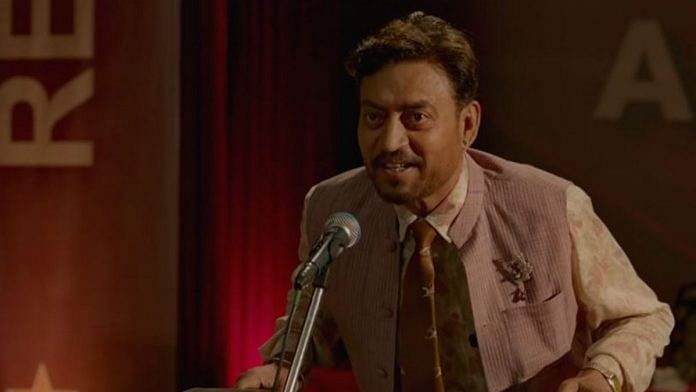Homi Adajania’s Angrezi Medium had big shoes to fill, being a spinoff of the much-loved 2017 hit Hindi Medium.
With strong performances from its lead actors (some repeats from the original) and a generous helping of excellent comic moments along with enough emotion to tug at your heartstrings, the film starts off well. But an overwritten plot filled with many avoidable clichés leaves one feeling like they had overstuffed themselves eating what was at first a perfectly pleasant meal.
Just like in Hindi Medium, protagonist Champak Bansal (Irrfan Khan) is a simple-minded halwai (confectioner), but this time he is in Udaipur, and not Chandni Chowk. His daughter Tarika (Radhika Madan), however, has her sights set far beyond the bylanes of their family-inherited sweetmeat shop Ghasite Ram’s, having long harboured the dream of going abroad.
Tarika finds her golden opportunity when her school announces a partnership with Truford University (possibly a euphemism for Oxford) in London. Only the top three students of the school will be selected, but Tarika is nearly at the bottom of her class — even her own father doubts she has what it takes. But with months of hardwork and grit, and lots of help from her archetypal nerdy classmate who would rather go to IIT than London, she manages the score she needs.
But of course, her well-meaning, but half-witted father and his messy family-feud drama somehow screw it all up. From then on, the film becomes about a series of uphill challenges Champak Bansal takes on to get his daughter to Truford, by hook or with the help of many crooks. After not allowing her mother, who died when Tarika was young girl, to study after marriage, he couldn’t possibly let his daughter’s dream die a premature death as well.
Departure from Hindi Medium, and a lot, lot more
There is a commonly held belief that most Bollywood films with a promise start to go awry post-interval. But in the case of Angrezi Medium, that point was reached earlier.
After the initial setback of not being able to pursue Tarika’s admission through her school’s partnership, and also failing to avail of the foreign student quota, Champak Bansal decides getting British citizenship is the only way forward and lands up in London to procure it.
Only if it were that simple, right?
It is after arriving in London that the film nosedives into a series of clichés — sniffer dogs seeking out pickle bottles in luggage, paranoid immigration officers, a painful deportation and a series of elaborate and illegal moves to sneak back into the country.
At first, the film seemed like an interesting departure from the original movie’s commentary on the intersection of class and language in India’s private school system (remember that inspired dialogue “Iss desh mein Angrezi zubaan nahi, class hain”?)
But it is soon overshadowed by the convoluted plot that winds up looking at cracks in the immigration system, the difficulties of living abroad, the gaps between young adults and their parents, and finally, how even the toughest foreign universities, too, can be penetrated with the help of one thing — money.
For every problem, Champak and his sparring-but-loving brother Ghasiteram (Deepak Dobriyal) find a solution — one that often involves breaking many laws and an unending supply of cash.
Kareena Kapoor’s much anticipated performance was a bit of a letdown. Her grumpy cop Naina Kohli, who somehow manages to repeatedly bump into Champak and Ghasiteram, is not allowed much complexity or depth.
Tilottama Shome once again plays a shrewd education consultant, while Pankaj Tripathi’s cameo is easily one of the most enjoyable moments of the film.
And Deepak Dobriyal, as always, steals the show with his delightful comic timing, while Irrfan Khan delivers a solid, heart-wrenching performance of an overbearing but loving father.
Radhika Madan’s baby voice is a bit much to digest at times, but she delivers a well-rounded performance of a sheltered young girl who is ready to be a self-reliant adult.
The chemistry between Khan and Madan is palpable. But with the complicated storyline, even this did not sit right at times. While Tarika is trying to build a new “normal” life of partying with friends, working at a new part-time job and trying to get a white boy to notice her — all before university actually began — Khan is out there trying to steer clear of cops, hack through citizenship laws and gamble enough to donate to an entire wing to her dream college to get her a spot.
Naturally, the chasm between the father and daughter then seems much wider, with Tarika coming off as a self-absorbed brat who is unaware of the hardships her father is undertaking for her.
Still, the film’s best takeaway is the father-daughter dynamic that explores a parent’s struggle to accept that it is finally time to let his child grow up and be independent.
Also read: Jalal Agha, the star kid who was averse to nepotism



